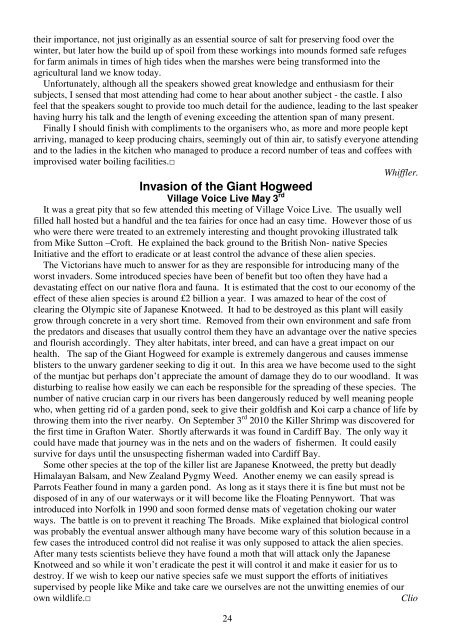village voice 70.pub - Dersingham Parish Council
village voice 70.pub - Dersingham Parish Council
village voice 70.pub - Dersingham Parish Council
You also want an ePaper? Increase the reach of your titles
YUMPU automatically turns print PDFs into web optimized ePapers that Google loves.
their importance, not just originally as an essential source of salt for preserving food over the<br />
winter, but later how the build up of spoil from these workings into mounds formed safe refuges<br />
for farm animals in times of high tides when the marshes were being transformed into the<br />
agricultural land we know today.<br />
Unfortunately, although all the speakers showed great knowledge and enthusiasm for their<br />
subjects, I sensed that most attending had come to hear about another subject - the castle. I also<br />
feel that the speakers sought to provide too much detail for the audience, leading to the last speaker<br />
having hurry his talk and the length of evening exceeding the attention span of many present.<br />
Finally I should finish with compliments to the organisers who, as more and more people kept<br />
arriving, managed to keep producing chairs, seemingly out of thin air, to satisfy everyone attending<br />
and to the ladies in the kitchen who managed to produce a record number of teas and coffees with<br />
improvised water boiling facilities.□<br />
Whiffler.<br />
Invasion of the Giant Hogweed<br />
Village Voice Live May 3 rd<br />
It was a great pity that so few attended this meeting of Village Voice Live. The usually well<br />
filled hall hosted but a handful and the tea fairies for once had an easy time. However those of us<br />
who were there were treated to an extremely interesting and thought provoking illustrated talk<br />
from Mike Sutton –Croft. He explained the back ground to the British Non- native Species<br />
Initiative and the effort to eradicate or at least control the advance of these alien species.<br />
The Victorians have much to answer for as they are responsible for introducing many of the<br />
worst invaders. Some introduced species have been of benefit but too often they have had a<br />
devastating effect on our native flora and fauna. It is estimated that the cost to our economy of the<br />
effect of these alien species is around £2 billion a year. I was amazed to hear of the cost of<br />
clearing the Olympic site of Japanese Knotweed. It had to be destroyed as this plant will easily<br />
grow through concrete in a very short time. Removed from their own environment and safe from<br />
the predators and diseases that usually control them they have an advantage over the native species<br />
and flourish accordingly. They alter habitats, inter breed, and can have a great impact on our<br />
health. The sap of the Giant Hogweed for example is extremely dangerous and causes immense<br />
blisters to the unwary gardener seeking to dig it out. In this area we have become used to the sight<br />
of the muntjac but perhaps don’t appreciate the amount of damage they do to our woodland. It was<br />
disturbing to realise how easily we can each be responsible for the spreading of these species. The<br />
number of native crucian carp in our rivers has been dangerously reduced by well meaning people<br />
who, when getting rid of a garden pond, seek to give their goldfish and Koi carp a chance of life by<br />
throwing them into the river nearby. On September 3 rd 2010 the Killer Shrimp was discovered for<br />
the first time in Grafton Water. Shortly afterwards it was found in Cardiff Bay. The only way it<br />
could have made that journey was in the nets and on the waders of fishermen. It could easily<br />
survive for days until the unsuspecting fisherman waded into Cardiff Bay.<br />
Some other species at the top of the killer list are Japanese Knotweed, the pretty but deadly<br />
Himalayan Balsam, and New Zealand Pygmy Weed. Another enemy we can easily spread is<br />
Parrots Feather found in many a garden pond. As long as it stays there it is fine but must not be<br />
disposed of in any of our waterways or it will become like the Floating Pennywort. That was<br />
introduced into Norfolk in 1990 and soon formed dense mats of vegetation choking our water<br />
ways. The battle is on to prevent it reaching The Broads. Mike explained that biological control<br />
was probably the eventual answer although many have become wary of this solution because in a<br />
few cases the introduced control did not realise it was only supposed to attack the alien species.<br />
After many tests scientists believe they have found a moth that will attack only the Japanese<br />
Knotweed and so while it won’t eradicate the pest it will control it and make it easier for us to<br />
destroy. If we wish to keep our native species safe we must support the efforts of initiatives<br />
supervised by people like Mike and take care we ourselves are not the unwitting enemies of our<br />
own wildlife.□ Clio<br />
24


